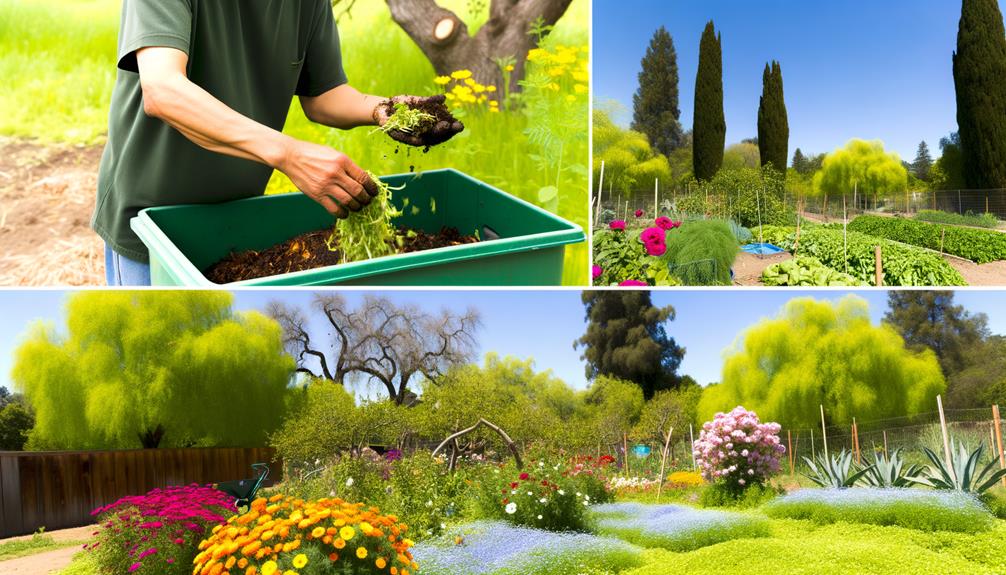

Yes, you can compost alfalfa sprouts. They’re nutrient-rich and can enhance your compost pile’s nitrogen content, improve soil structure, and enhance microbial activity. To compost them effectively, chop or blend the sprouts for quicker decomposition, and make sure they’re well-mixed with both green and brown materials.
Maintain a balanced 2:1 ratio of greens to browns, monitor moisture levels, and turn the pile regularly. This helps prevent odors and pest issues. Properly composted alfalfa sprouts will improve the quality of your finished compost, making your garden soil richer and more fertile. Want to master composting techniques? Keep going to discover more tips and tricks.
When you compost alfalfa sprouts, you’re not only reducing waste but also enriching your soil with valuable nutrients. This can benefit your garden applications in several ways:
Incorporating alfalfa sprouts into your compost can transform your garden soil, making it more productive and fertile. It’s a simple step that yields significant benefits for any gardening enthusiast.
Also Read: Can You Compost Balloon?
To get the most out of your compost, it’s important to understand how to properly incorporate alfalfa sprouts into the pile. Start by knowing the growth stages of alfalfa sprouts. Younger sprouts decompose faster, adding valuable nutrients quickly.

Once you harvest them, use a chopping or blending method to break them down. This speeds up decomposition and prevents clumping. Mix the chopped sprouts evenly into your compost pile to guarantee proper aeration.
Add a mix of green (nitrogen-rich) and brown (carbon-rich) materials to balance your compost. Regularly turn the pile to accelerate the composting process.
Also Read: Can You Compost Bacon Grease?
When composting alfalfa sprouts, you need to watch out for moisture retention issues, which can lead to a soggy compost pile.
Be mindful that these sprouts might also cause odor problems if not balanced with dry materials.
Additionally, they can attract pests, so it’s important to manage your compost mix carefully.
One significant drawback of composting alfalfa sprouts is their tendency to retain excessive moisture, which can lead to a soggy compost pile. This excess moisture can hinder water drainage, making it difficult for your compost to stay aerated and healthy.
To manage moisture retention and aid rot prevention, consider the following tips:
Following these tips will help maintain a balanced compost pile.
Composting alfalfa sprouts can sometimes cause unpleasant odors, making it important to manage your compost pile effectively. Odors often arise from poor compost aeration, which leads to anaerobic conditions. To prevent this, regularly turn your compost pile to guarantee proper airflow. This helps break down the organic matter more efficiently and reduces smell.
Adding dry materials like leaves or straw can also help balance moisture levels and improve aeration. If you notice persistent odors, consider using odor solutions like compost activators or adding more carbon-rich materials to balance the nitrogen from the alfalfa sprouts. Maintaining a good mix of green and brown materials is essential.
Alfalfa sprouts in your compost pile can attract pests like rodents and insects if not managed properly. To prevent pest infestations and rodent problems, you must take specific steps to guarantee your compost remains pest-free.
Also Read: Can You Compost Cotton Balls? The Shocking Truth Revealed!
To prepare alfalfa sprouts for compost, start by thoroughly rinsing them to remove any dirt or debris. This sprout washing step guarantees you’re not adding unwanted contaminants to your compost pile.
After rinsing, you’ll want to move on to sprout chopping. Cut the alfalfa sprouts into smaller pieces to help them break down more quickly in the compost. Smaller pieces have a larger surface area, which speeds up the decomposition process and makes it easier for microorganisms to do their job.
Once chopped, mix the alfalfa sprouts into your compost pile, ensuring they’re evenly distributed. This will help them integrate well and promote efficient composting.
Achieving a well-balanced compost involves mixing green and brown materials in the right proportions. To create the perfect compost, you need to manage the carbon ratio and nitrogen balance.
Here’s how you can do it:
Greens provide nitrogen, essential for microbial growth, while browns contribute carbon, which is important for energy. By maintaining this balance, you’ll foster a thriving compost environment.
To guarantee that your compost is progressing well, you’ll need to keep an eye on temperature and moisture levels. Regularly check the temperature using a compost thermometer to maintain the ideal range of 135-160°F.

Also, feel the compost to gauge moisture; it should be as damp as a wrung-out sponge.
Maintaining the proper temperature is essential for effective composting of alfalfa sprouts. Proper heat management guarantees that your compost breaks down efficiently.
Temperature fluctuations can hinder the composting process, so regular monitoring is key.
Here are three tips to help you manage the compost temperature:
Maintaining the appropriate moisture level in your compost pile is essential for the efficient breakdown of alfalfa sprouts. You’ll want to keep the moisture content similar to a wrung-out sponge. Too dry, and decomposition slows; too wet, and you risk foul odors and pests. Using moisture sensors can help you monitor the levels accurately.
If the pile is too wet, incorporate drying methods like adding dry leaves or straw to balance it out. Conversely, if it’s too dry, sprinkle water evenly across the pile. Regularly turning the compost can also help distribute moisture more uniformly.
Also Read: Can You Compost Agave?
Once your compost is ready, spread it evenly across your garden beds to enrich the soil and boost plant growth. This organic matter provides essential nutrients, enhancing soil enrichment, and improving plant health.
Here’s how you can maximize its benefits:
Composting alfalfa sprouts is straightforward and beneficial. They enrich your compost pile with essential nutrients, enhancing soil health.
Make sure you balance green and brown materials to maintain a healthy compost mix. Regularly monitor and turn your compost to speed up decomposition.
Once finished, use the nutrient-rich compost in your garden to promote robust plant growth. By composting alfalfa sprouts, you’ll contribute to sustainable gardening and reduce waste effectively.
